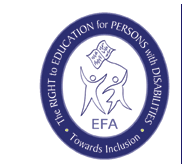"Convention on the Rights of Persons withDisabilities Article 24 Education
1. States Parties recognize the right of persons with disabilities to education.With a view to realizing this right without discrimination and on the basis ofequal opportunity, States Parties shall ensure an inclusive educationsystem at all levels and lifelong learning directed to:a. The full development of human potential and sense of dignity andself-worth, and the strengthening of respect for human rights,fundamental freedoms and human diversity;b. The development by persons with disabilities of their personality,talents and creativity, as well as their mental and physical abilities,to their fullest potential;c. Enabling persons with disabilities to participate effectively in a freesociety.
2. In realizing this right, States Parties shall ensure that:a. Persons with disabilities are not excluded from the generaleducation system on the basis of disability, and that children withdisabilities are not excluded from free and compulsory primaryeducation, or from secondary education, on the basis of disability;b. Persons with disabilities can access an inclusive, quality and freeprimary education and secondary education on an equal basis withothers in the communities in which they live;c. Reasonable accommodation of the individual's requirements isprovided;d. Persons with disabilities receive the support required, within thegeneral education system, to facilitate their effective education;e. Effective individualized support measures are provided inenvironments that maximize academic and social development,consistent with the goal of full inclusion.
3. States Parties shall enable persons with disabilities to learn life and socialdevelopment skills to facilitate their full and equal participation ineducation and as members of the community. To this end, States Partiesshall take appropriate measures, including:a. Facilitating the learning of Braille, alternative script, augmentativeand alternative modes, means and formats of communication andorientation and mobility skills, and facilitating peer support andmentoring;b. Facilitating the learning of sign language and the promotion of thelinguistic identity of the deaf community;c. Ensuring that the education of persons, and in particular children,who are blind, deaf or deafblind, is delivered in the mostappropriate languages and modes and means of communication forthe individual, and in environments which maximize academic andsocial development.
4. In order to help ensure the realization of this right, States Parties shalltake appropriate measures to employ teachers, including teachers withdisabilities, who are qualified in sign language and/or Braille, and to trainprofessionals and staff who work at all levels of education. Such trainingshall incorporate disability awareness and the use of appropriateaugmentative and alternative modes, means and formats ofcommunication, educational techniques and materials to support personswith disabilities.
5. States Parties shall ensure that persons with disabilities are able toaccess general tertiary education, vocational training, adult education andlifelong learning without discrimination and on an equal basis with others.To this end, States Parties shall ensure that reasonable accommodation isprovided to persons with disabilities."
http://www.inclusionflagship.net/Article24.pdf
Sosiaali- ja terveysministeriön sivulla on seuraavanlainen tulkinta tästä artiklasta:
"
Oikeus koulutukseen
Vammaisilla ihmisillä on oikeus
elinikäiseen oppimiseen.
Vammaisilla on oikeus saada opetusta
yleisessä koulutusjärjestelmässä
yhdenvertaisesti muiden kanssa.
Heillä on oikeus yksilöllisen tukeen
oppimisen edistämiseksi.
Koulutuksessa on huomioitava muun muassa
näkövammaisten tarpeet pistekirjoituksen
ja liikkumistaitojen opetukseen.
Kuulovammaisten viittomakielen opetusta
ja muuta kielen oppimista on edistettävä.
Kaikilla kouluissa työskentelevillä
henkilöillä tulee olla riittävä koulutus,
jotta he osaavat toimia oikein
vammaisille suunnatussa kouluympäristössä."
http://www.stm.fi/Resource.phx/publishing/store/2007/05/ka1180612770176/passthru.pdf
STM:n tulkinta on varsin laimea verrattuna alkuperäiseen tekstiin. Ihmettelen, miksi alkuperäistä tekstiä on yleensä tulkittu mitenkään! Senhän olisi voinut vain yksinkertaisesti kääntää suomen kielelle. Tämä maininta on varsin laimea ja jättää runsaasti tulkinnan varaa: "Vammaisilla on oikeus saada opetusta yleisessä koulutusjärjestelmässä yhdenvertaisesti muiden kanssa. Heillä on oikeus yksilöllisen tukeen oppimisen edistämiseksi."
Sen sijaan alkuperäinen teksti kuuluu näin: "
States Parties shall ensure that:
a. Persons with disabilities are not excluded from the general
education system on the basis of disability, and that children with
disabilities are not excluded from free and compulsory primary
education, or from secondary education, on the basis of disability;
b. Persons with disabilities can access an inclusive, quality and free
primary education and secondary education on an equal basis with
others in the communities in which they live;
c. Reasonable accommodation of the individual's requirements is
provided;
d. Persons with disabilities receive the support required, within the
general education system, to facilitate their effective education;
e. Effective individualized support measures are provided in
environments that maximize academic and social development,
consistent with the goal of full inclusion."
Sama teksti käännettynä: "Jäsenvaltiot vakuuttavat, että:
1. vammaisia ei jätetä yleisen koulujärjestelmän ulkopuolelle vammaisuuden vuoksi, ja että vammaisia lapsia ei jätetä ilmaisen ja pakollisen perusopetuksen ulkopuolelle, saati toisen asteen koultuksen ulkopuolelle,
2. Vammaiset voivat päästä inklusiiviseen, ilmaiseen ja laadukkaaseen perusopetukseen sekä toisen asteen opetukseen samoin perustein kuin muutkin siinä yhteisössä jossa he elävät.
3. Vammaisille taataan järkevä mukauttaminen opetukseen, jos yksilön tarpeet sitä vaativat.
4. Vammaiset saavat sen tuen jota he tarvitsevat yleisopetuksen sisällä, jotta heidän tehokas koulutuksensa helpottuisi.
5. Tehokkaat yksilöllisteyt tukitoimet tarjotaan ympäristöissä, jotka maksimoivat akateemisen ja sosiaalisen kehityksen, sisältäen päämääränään täyden inkluusion."
Tarvitseeko tuohon enää mitään lisätä?
Sen verran voisi lisätä, että miksi ihmeessä Suomessa ei asioista puhuta niiden oikeilla nimillä, vaan nämä kansainväliset sopimuksetkin pitää "tulkita" laimeammiksi kuin ne ovatkaan!
perjantai 13. helmikuuta 2009
Vammaisten henkilöiden oikeuksia koskeva YK:n yleissopimus. Artikla 24, koulutus.
Tunnisteet:
Erityisopetus,
hyväksyntä,
ihmisarvo,
Inkluusio,
Osallistumisen puute,
tasa-arvo,
UNESCO,
vammainen
Tilaa:
Lähetä kommentteja (Atom)





Ei kommentteja:
Lähetä kommentti
Huomaa: vain tämän blogin jäsen voi lisätä kommentin.